The 7 Habits of Highly Effective People(成功人士的七个习惯)
The 7 Habits of Highly Effective People

﹡受成长历程,社会环境及个人观念的影响。
15 / GE /
思维模式转换
Paradigm Shift
如果我们想要有重大的改变,我们必须先改变 我们的思维方式。 《科学革命的构架》(The Structure of Scientific Revolutions)一书的作者汤姆斯.肯 指出:每一项科学研究的重大突破几乎都是先 打破传统打破旧观念,然后取得成功的。
我们的家庭使命
创造一个充满爱与和谐轻松愉快修 身养性的氛围。 提供每一个家庭成员既独立承担责 任又互相依赖的机会,从而使人生 更有意义。
36 / GE /
我的信条
我视每一日为新的开始,因此我有更多机会书写人生新的篇章。我从宝贵 的生活经历中学习得到成长。我把握每一个机会, 不畏艰难,不怕失败。勇于承担责任。
在信任之上的。
• 信任只给值得被信任 的人
个人 可信度
11 / GE /
品格与能力
Character and Competence
品格:品格良好的人具有正直、 成熟以及富足的心态。 能力:能力强的人具有专业知识 与技能。
信任度 Trustworthines s
信任
Trust
品格
Character
能力
习惯 持续成熟模式 原则 思维 产能/产出平衡效能的原则
习惯的培养
知识是做什么以及为何去做; 技能是如何去做; 意愿是想要去做。
习惯 技巧 ( 如何做 ) 意愿 ( 想做 ) 知识 ( 做什么, 为何做 )
要养成良好的习惯,我们必须具备以上三点。
6/ GE /
习惯的特点
• 长期形成
• 自然流畅 • 不思而为
我是个负责的丈夫(妻子)和父(母)亲,我很重视这两个角色。我努力 同家人朋友商业伙伴建立良好的双赢关系。我每日在他人的情感帐户内存 款,以保持良好人际关系并建立高度信任。
THE7HABITS
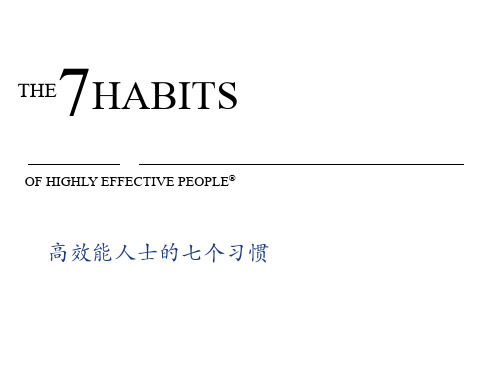
如果我们想要有重大的改变,我们必须先改变 我们的思维方式。 《科学革命的构架》(The Structure of Scientific Revolutions)一书的作者汤姆斯.肯指出:每一项科 学研究的重大突破几乎都是先打破传统打破旧 观念,然后取得成功的。
高效能人士的七个习惯
﹡放之四海而皆准,恒古不变 ﹡产出可预期的结果 ﹡不以个人意志为转移 ﹡无论我们了解或接受与否,它依然存在 ﹡当了解后,它是不证自明并且可以应用 的
价值观 指我们对人事想法或 原则所定的价值或优先次序。
﹡自我选择的信念及想法 ﹡内在的主观的,基于我们的世界观
﹡受成长历程,社会环境及个人观念的影响。
思维模式转换
主动积极 --- 掌握你最大的自由
以终为始 --- 设定平衡人生目标 要事第一 --- 忙要忙得有意义 双赢思维 --- 你不是一座孤岛 知彼解已 --- 做个双向传播的“聆听者”
统合综效 --- 集思广益
不断更新 --- 最佳的自我投资策略
几个概念
习惯 持续成熟模式 产能/产出平衡效能的原则
习惯的培养
不 断 更 新
Independent(独立期)
3 要事第一 1 个人成功 2 积极主动 以终为始
Dependent (依赖期)
时间管理矩阵图 Time Management Matrix
紧急
1危机 2紧急的问题 3有限期的任务会议准备事项 1准备事项 2预防工作 3价值观的澄清 4计划
不紧急
重 要
家庭 金钱 配偶 工作 影响圈 原则
力量
自我
名利
享乐
方向
宗教
力量 -- 行动的能力
敌人 朋友
高效能人士的七个习惯-en
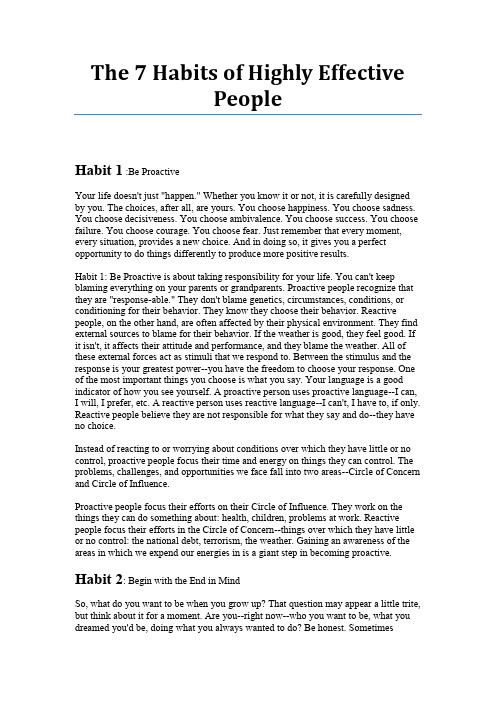
The 7 Habits of Highly EffectivePeopleHabit 1 :Be ProactiveYour life doesn't just "happen." Whether you know it or not, it is carefully designed by you. The choices, after all, are yours. You choose happiness. You choose sadness. You choose decisiveness. You choose ambivalence. You choose success. You choose failure. You choose courage. You choose fear. Just remember that every moment, every situation, provides a new choice. And in doing so, it gives you a perfect opportunity to do things differently to produce more positive results.Habit 1: Be Proactive is about taking responsibility for your life. You can't keep blaming everything on your parents or grandparents. Proactive people recognize that they are "response-able." They don't blame genetics, circumstances, conditions, or conditioning for their behavior. They know they choose their behavior. Reactive people, on the other hand, are often affected by their physical environment. They find external sources to blame for their behavior. If the weather is good, they feel good. If it isn't, it affects their attitude and performance, and they blame the weather. All of these external forces act as stimuli that we respond to. Between the stimulus and the response is your greatest power--you have the freedom to choose your response. One of the most important things you choose is what you say. Your language is a good indicator of how you see yourself. A proactive person uses proactive language--I can, I will, I prefer, etc. A reactive person uses reactive language--I can't, I have to, if only. Reactive people believe they are not responsible for what they say and do--they have no choice.Instead of reacting to or worrying about conditions over which they have little or no control, proactive people focus their time and energy on things they can control. The problems, challenges, and opportunities we face fall into two areas--Circle of Concern and Circle of Influence.Proactive people focus their efforts on their Circle of Influence. They work on the things they can do something about: health, children, problems at work. Reactive people focus their efforts in the Circle of Concern--things over which they have little or no control: the national debt, terrorism, the weather. Gaining an awareness of the areas in which we expend our energies in is a giant step in becoming proactive.Habit 2: Begin with the End in MindSo, what do you want to be when you grow up? That question may appear a little trite, but think about it for a moment. Are you--right now--who you want to be, what you dreamed you'd be, doing what you always wanted to do? Be honest. Sometimespeople find themselves achieving victories that are empty--successes that have come at the expense of things that were far more valuable to them. If your ladder is not leaning against the right wall, every step you take gets you to the wrong place faster. Habit 2 is based on imagination--the ability to envision in your mind what you cannot at present see with your eyes. It is based on the principle that all things are created twice. There is a mental (first) creation, and a physical (second) creation. The physical creation follows the mental, just as a building follows a blueprint. If you don't make a conscious effort to visualize who you are and what you want in life, then you empower other people and circumstances to shape you and your life by default. It's about connecting again with your own uniqueness and then defining the personal, moral, and ethical guidelines within which you can most happily express and fulfill yourself. Begin with the End in Mind means to begin each day, task, or project with a clear vision of your desired direction and destination, and then continue by flexing your proactive muscles to make things happen.One of the best ways to incorporate Habit 2 into your life is to develop a Personal Mission Statement. It focuses on what you want to be and do. It is your plan for success. It reaffirms who you are, puts your goals in focus, and moves your ideas into the real world. Your mission statement makes you the leader of your own life. You create your own destiny and secure the future you envision.Habit 3: Put First Things FirstTo live a more balanced existence, you have to recognize that not doing everything that comes along is okay. There's no need to overextend yourself. All it takes is realizing that it's all right to say no when necessary and then focus on your highest priorities.Habit 1 says, "You're in charge. You're the creator." Being proactive is about choice. Habit 2 is the first, or mental, creation. Beginning with the End in Mind is about vision. Habit 3 is the second creation, the physical creation. This habit is where Habits 1 and 2 come together. It happens day in and day out, moment-by-moment. It deals with many of the questions addressed in the field of time management. But that's not all it's about. Habit 3 is about life management as well--your purpose, values, roles, and priorities. What are "first things?" First things are those things you, personally, find of most worth. If you put first things first, you are organizing and managing time and events according to the personal priorities you established in Habit 2.Habit 4: Think Win-WinThink Win-Win isn't about being nice, nor is it a quick-fix technique. It is a character-based code for human interaction and collaboration.Most of us learn to base our self-worth on comparisons and competition. We think about succeeding in terms of someone else failing--that is, if I win, you lose; or if you win, I lose. Life becomes a zero-sum game. There is only so much pie to go around, and if you get a big piece, there is less for me; it's not fair, and I'm going to make sure you don't get anymore. We all play the game, but how much fun is it really?Win-win sees life as a cooperative arena, not a competitive one. Win-win is a frame of mind and heart that constantly seeks mutual benefit in all human interactions. Win-win means agreements or solutions are mutually beneficial and satisfying. We both get to eat the pie, and it tastes pretty darn good!A person or organization that approaches conflicts with a win-win attitude possesses three vital character traits:1.Integrity: sticking with your true feelings, values, and commitments2.Maturity: expressing your ideas and feelings with courage and considerationfor the ideas and feelings of others3.Abundance Mentality: believing there is plenty for everyoneMany people think in terms of either/or: either you're nice or you're tough. Win-win requires that you be both. It is a balancing act between courage and consideration. To go for win-win, you not only have to be empathic, but you also have to be confident. You not only have to be considerate and sensitive, you also have to be brave. To do that--to achieve that balance between courage and consideration--is the essence of real maturity and is fundamental to win-win.Habit 5: Seek First to Understand, Then to Be UnderstoodCommunication is the most important skill in life. You spend years learning how to read and write, and years learning how to speak. But what about listening? What training have you had that enables you to listen so you really, deeply understand another human being? Probably none, right?If you're like most people, you probably seek first to be understood; you want to get your point across. And in doing so, you may ignore the other person completely, pretend that you're listening, selectively hear only certain parts of the conversation or attentively focus on only the words being said, but miss the meaning entirely. So why does this happen? Because most people listen with the intent to reply, not to understand. You listen to yourself as you prepare in your mind what you are going to say, the questions you are going to ask, etc. You filter everything you hear through your life experiences, your frame of reference. You check what you hear against your autobiography and see how it measures up. And consequently, you decide prematurely what the other person means before he/she finishes communicating. Do any of the following sound familiar?"Oh, I know just how you feel. I felt the same way." "I had that same thing happen to me." "Let me tell you what I did in a similar situation."Because you so often listen autobiographically, you tend to respond in one of four ways:Evaluating:You judge and then either agree or disagree.Probing:You ask questions from your own frame of reference.Advising:You give counsel, advice, and solutions to problems.Interpreting:Y ou analyze others' motives and behaviors based on your ownexperiences.You might be saying, "Hey, now wait a minute. I'm just trying to relate to the person by drawing on my own experiences. Is that so bad?" In some situations, autobiographical responses may be appropriate, such as when another person specifically asks for help from your point of view or when there is already a very high level of trust in the relationship.Habit 6: SynergizeTo put it simply, synergy means "two heads are better than one." Synergize is the habit of creative cooperation. It is teamwork, open-mindedness, and the adventure of finding new solutions to old problems. But it doesn't just happen on its own. It's a process, and through that process, people bring all their personal experience and expertise to the table. Together, they can produce far better results that they could individually. Synergy lets us discover jointly things we are much less likely to discover by ourselves. It is the idea that the whole is greater than the sum of the parts. One plus one equals three, or six, or sixty--you name it.When people begin to interact together genuinely, and they're open to each other's influence, they begin to gain new insight. The capability of inventing new approaches is increased exponentially because of differences.Valuing differences is what really drives synergy. Do you truly value the mental, emotional, and psychological differences among people? Or do you wish everyone would just agree with you so you could all get along? Many people mistake uniformity for unity; sameness for oneness. One word--boring! Differences should be seen as strengths, not weaknesses. They add zest to life.Habit 7: Sharpen the SawSharpen the Saw means preserving and enhancing the greatest asset you have--you. It means having a balanced program for self-renewal in the four areas of your life: physical, social/emotional, mental, and spiritual. Here are some examples of activities: Physical:Beneficial eating, exercising, and restingSocial/Emotional:Making social and meaningful connections with others Mental:Learning, reading, writing, and teachingSpiritual:Spending time in nature, expanding spiritual self throughmeditation, music, art, prayer, or serviceAs you renew yourself in each of the four areas, you create growth and change in your life. Sharpen the Saw keeps you fresh so you can continue to practice the other six habits. You increase your capacity to produce and handle the challenges around you. Without this renewal, the body becomes weak, the mind mechanical, the emotions raw, the spirit insensitive, and the person selfish. Not a pretty picture, is it?Feeling good doesn't just happen. Living a life in balance means taking the necessary time to renew yourself. It's all up to you. You can renew yourself through relaxation.Or you can totally burn yourself out by overdoing everything. You can pamper yourself mentally and spiritually. Or you can go through life oblivious to your well-being. You can experience vibrant energy. Or you can procrastinate and miss out on the benefits of good health and exercise. You can revitalize yourself and face a new day in peace and harmony. Or you can wake up in the morning full of apathy because your get-up-and-go has got-up-and-gone. Just remember that every day provides a new opportunity for renewal--a new opportunity to recharge yourself instead of hitting the wall. All it takes is the desire, knowledge, and skill.The 8th Habit®:From Effectiveness to Greatness In today's challenging and complex world, being highly effective is the price of entry to the playing field. To thrive, innovate, excel, and lead in this new reality, we must reach beyond effectiveness toward fulfillment, contribution, and greatness. Research is showing, however, that the majority of people are not thriving. They are neither fulfilled nor excited. Tapping into the higher reaches of human motivation requires a new mindset, a new skill-set --a new habit. Dr. Covey's new book, The 8th Habit®: From Effectiveness to Greatness, is a roadmap to help you find daily fulfillment and excitement.。
高效能人士的七个习惯 -7 Habits of Highly Effective People
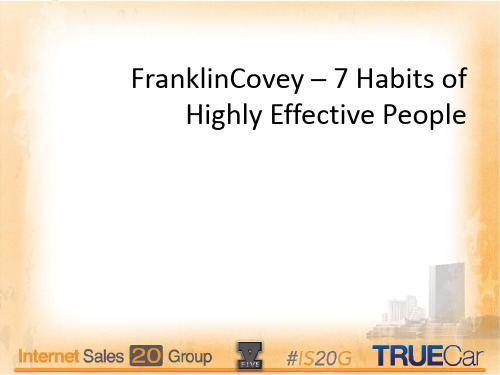
Empathic Listening Challenge
Synergy is when two or more people produce more together than the sum of what they could produce separately.
PG: 48
Valuing Differences
Tips for Valuing Differences
Urgent
An activity that you or others feel requires immediate attention.
Important
An activity that you find valuable and that contributes to your mission, values, and high-priority goals.
The 7 Habits of Highly Effective People
Habit
1 2 3
Be Proactive
®
Take responsibility for your life.
Habit
Begin With the End in Mind
®
Define your purpose and mission in life.
Your facilitator is: _________________ ____
7 HABITS(高效能人士的7个习惯)
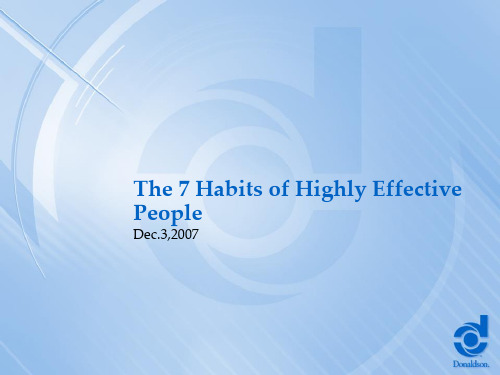
Habit 3 Put First Things First 要事第一
Performance Results:
绩效结果
Execute Strategy
执行战略
Apply effective delegation skills
应用有效的授权技巧
Focus on important activities 事务
The timeless principles taught give people the foundation to achieve unheard of levels of effectiveness in their lves at work and at home.
高效的个人带来高效的组织
The proof is in the process
The results are real and measurable.
By making people effective, your organization can be effective.
课程结果
培训的效果是真实而可衡量的 只有员工高效,组织才能高效
These guiding principles set the stage for profound personal growth and engage others on the path to success.
久经考验的理论基础将帮助个人成长,实现预期目标
要想取得最佳的绩效,必须先连接个人在组织 能发挥多大的作用。遗憾的是,富兰克林柯维公司 的“执行力调查”(XQ调查)数据显示:仅有 40%的员工认为他们在工作中充分发挥了自己的激 情和才干。
学员将主要取得以下学习成果:
✓ 在生活和工作中都获得更好的成绩 ✓ 发展重要的关系,加强合作,提高产能 ✓ 通过专注于最重要的事务,提高生产力 ✓ 实现健康的工作与生活平衡
高效能人士的7个习惯7 Habits for Effective People
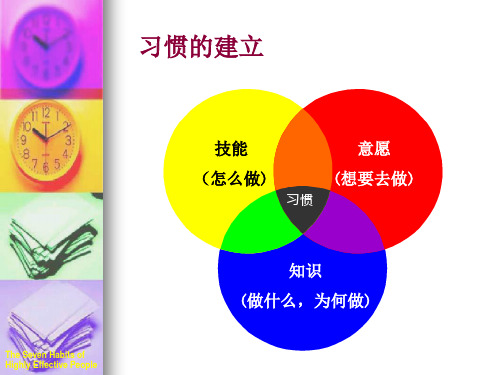
为
行为
• 行动之前先展望结果 • 创造个人使命宣言并 以它为人生蓝图
The Seven Habits of Highly Effective People
使命宣言
我们要将一个人成功地送上月球,并 能使他安全地返回地球。
我们是“女士和先生”服务于“女士 和先生”。We are ladies and gentlemen serving ladies and gentlemen.
更有效能的时间规划
星期一 星期二 星期三 星期四 星期五 星期六 星期日
II
II II II
II
II
I
I
II
The Seven Habits of Highly Effective People
WEEKLY COMPASS
what is the most important thing I can do in this role this week?
习惯的建立
技能
(怎么做)
习惯
意愿
(想要去做)
知识 (做什么,为何做)
The Seven Habits of Highly Effective People
持续成熟图
7 不断更新
互赖(我们)
知彼解己 统合综效
5
公众成功 双赢思维 4
6
独立(我)
要事第一
3
1
个人成功
2
主动积极
以终为始
依赖(你)
The Seven Habits of Highly Effective People
观 (思维)
(结果)
得
为(行为)
The Seven Habits of Highly Effective People
高效能人士的七个习惯

– 技能
• 如何去做
– 意愿
• 意愿是想要去做
技能
意愿
• 养成习惯
– 若要在生活中养成习惯,以 上三种缺一不可
(怎么做)
(想要去做)
10
THE 7 HABITS OF HIGHLY EFFECTIVE PEOPLE
思维引发行为; 行为渐成习惯; 习惯塑造品格; 品格决定命运。
习惯的养成
知识 Knowledge
习惯的意义
人的行为总是一再重复,因此卓越 不是单一的举动,而是习惯。 ——亚里斯多德
13
THE 7 HABITS OF HIGHLY EFFECTIVE PEOPLE
持续成熟的模式 -- 成熟的三个阶段
• 依赖期:围绕着“你”这个观念。 ——你照顾我;你为我的成败得 失负责;事情若有差错, 我便怪 罪于你。 • 独立期:着眼于“我”的观念。 ——我可以自立;我为自己负责; 我可以自由选择。 • 互赖期:从“我们” 的观念出发。 ——我们可以自主、合作、统合 综效, 共创伟大前程。
• 需要工作→被工作需要
26
THE 7 HABITS OF HIGHLY EFFECTIVE PEOPLE
情感帐户EBA • Emotional Bank Account
• 情感帐户是比喻情感关系中的信任程度, 因为人与人的每一次交往都可以被看作是
存款或提款。
• 存款能建立、维护或加强关系中的信任
思维转换
• 建立全新的观点
• 我们每个人都守着一扇自内开启的“改变之门” • 除了自己,没有人能为你开门 • 只要你愿意敞开心灵 • 抛却原有思维 • 把良好的原则化为习惯 • 成功的圆满就在掌握之中
22
THE 7 HABITS OF HIGHLY EFFECTIVE PEOPLE
2020新译林版高中英语选修三unit1课文翻译(英汉对照)

2020新牛津译林版选修第三册课文翻译unit1ReadingThe7Habits of Highly Effective People高效能人士的七个习惯The7Habits—An Overview7个习惯——概述We are what we repeatedly do.Excellence,then,is not an act,but a habit.我们就是我们反复做的事。
因此,优秀不是一种行为,而是一种习惯。
—Aristotle——亚里士多德Our character,basically,is a composite of our habits.“Sow a thought,reap an action;sow an action,reap a habit;sow a habit,reap a character;sow a character,reap a destiny,”the maxim goes.我们的性格基本上是由我们的习惯组成的。
有句格言说:“播种一个思想,收获一个行动;播种一个行动,收获一个习惯;播种一个习惯,收获一个性格;播种一个性格,收获一个命运。
”Habits are powerful factors in our lives.Because they are consistent,often unconscious patterns,they constantly,daily,express our character and produce our effectiveness...or ineffectiveness.习惯是我们生活中强大的因素。
因为它们是一致的,通常是无意识的模式,它们每天都在表达我们的性格,导致我们做事的高效率或者低效率。
As Horace Mann,the great educator,once said,“Habits are like a cable.We weave a strand of it every day and soon it cannot be broken.”I personally do not agree with the last part of his expression.I know they can be broken.Habits can be learned and unlearned.But I also know it isn't a quick fix.It involves a process and a tremendous commitment.正如伟大的教育家霍勒斯·曼曾经说过:“习惯就像一根电缆。
The 7 Habits of Highly Effective People(成功人士的七个习惯)

Be Proactive 积极主动 Begin with the End in Mind 以终为始 Put First Things First 要事第一 Think Win/Win 双赢思维 Seek First to Understand, Then to be Understood 知彼解己 Synergize 统合综效 Sharpen the Saw 不断更新
2
Habit 习惯
• Habit is the intersection of knowledge, skill and desire. 习惯是知识,技能和欲望的混合体.
• Knowledge is understanding what to do and why to do it. 知识是懂得该做什么和为何要做.
• An activity is important if we find it valuable and it contributes to our mission, values and goals. 一件重要的任务是视为有价值的和对我们的使命,价 值观和目标有贡献的.
16
Habit 3 - Put First Things First 要事第一
双赢思维是把生活看作是一个合作的舞台,达到利人利己的结果.
• Characteristics of win-win are:
双赢思维的个性:
– Seeks mutual benefit.
争取利人利己(寻求互惠互利).
– Is cooperative, not competitive.
是合作性,非竞争性.
• Studies have shown that only 7% of our communication is by words we say, another 38% by our sounds and how we say words, and 55% by our nonverbal and body. 研究证明,人与人之间的沟通,7% 是通过所说的文字,38% 是通过声音和语气,55% 是通过肢体语言.
高效能人士的七个习惯The 7 Habits of Highly Effective People讲解

全面观照生命 习惯七:不断更新 ——平衡的自我更新的原则
人生最值得的投资就是磨练自己,因为生 活与服务人群都得靠自己,着是最珍贵的工 具。 工作本身并不能带来经济上的安全感,具 备良好的思考、学习、创造与适应能力,才 能立于不败之地。拥有财富,并不代表经济 独立,拥有创造财富的能力才真正可靠。
与我们所爱的人、朋友,我们 的同事和谐一致,或曰统一, 是七个习惯最高的、最美好的 成果。
个人的成功:从依赖到独立 习惯三:要事第一 ——自我管理的原则
重要之事绝不可受芝麻绿豆小事的牵绊。 ——歌德(Goethe)德国诗人
有效的个人管理方法六标准: 1.一致 2.平衡 3.有重心 4.重人性 5.能变通 6.携带方便
公众的成功:从独立到互赖 情感帐户存款(Emotional Bank Account)
人际关系六种模式 利人利己(赢/赢) 损人利己(赢/输) 损己利人(输/赢) 两败俱伤(输/输) 独善其身(赢) 好聚好散(无交易)
公众的成功:从独立到互赖 习惯五:知彼解己 最重要的原则,那就是:知 彼解己——首先寻求去了解对方,然后 再争取让对方了解。这一原则是进行有 效人机交流的关键。
积极主动 试试看有没有其它可能性 我可以选择不同的作风 我可以控制自己的情绪 我可以想出有效的表达方式 我能选择适当的回应 我选择 我情愿 我打算……
个人的成功:从依赖到独立
习惯二:以终为始 ——自我领导的原则
太多人成功之后, 反而感到空虚;得到 名利之后,却发现牺 牲了更可贵的事物。 因此,我们务必掌握 真正重要的愿景,使 生活充满意义。
You are not alone! 你不是一座孤岛! 所谓感情帐户,储存的是增进人际关系不可或 缺的“信赖”,也就是他人与你相处时的一分 “安 全感”。 存入六种感情存款: 理解别人 注意小节 信守承诺 阐明期望 诚恳正直 勇于道歉
高效能人士的七个习惯The7HabitsofHighlyEffectivePeople
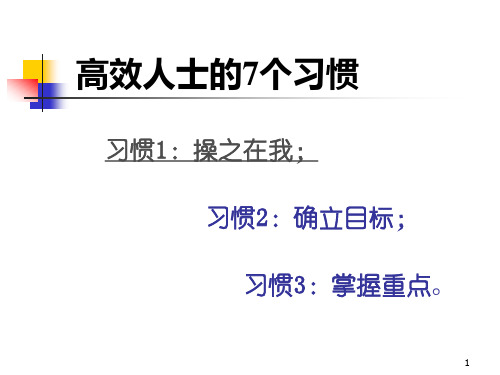
让我们试试其他可能性 我无能为力
我可以想出有效的表达 他们不会接受我的
方式
我可以选择不同的风格 我就是这样一个人
6
操之在我 Vs. 受制于人
主动积极
消极被动
让我们考虑替代性方案 没有我们能做的事
我能够选择一条不同的 途径
这就是我的做事方式, 我无法改变
我选择 我更喜欢
我不能 我必须
15
高效人士的7个习惯
习惯1:操之在我; 习惯2:确立目标; 习惯3:掌握重点。
16
互赖
设身处地
5
人际关系
的成功
集思广益 6
利人利己 4
独立
3 掌握重点
1 个人的成功
操之在我
倚赖
2 确立目标
17
百年之后的评价
你这一生有任何成就、贡献和值得怀念的事吗? 你是个称职的丈夫、妻子、父母和亲友吗? 你是个令人怀念的同事和伙伴吗? 你对关心你的人有什么影响?P
激励你深刻地思考人生 督促你反躬自省 帮助你看清什么对你是最重要的 开阔你的视野 使你牢记自己的目标和价值取向 使你每天朝着长期目标努力
25
撰写使命宣言涉及如下问题
有哪些东西是我最珍视并想拥有的? 我究竟是什么样的人? 有哪些品格是我想拥有或仿效的? 我想为社会创造什么财富?留下什么传承? 练习
13
付诸实践 Action is power!
对自己的性格和行为负责 不要等待什么事情发生或某个人去关心你 通过采取实际的,可行的对策去同不好的环境
抗争 不要浪费时间和精力于你无法改变的事情上 发现错误后,立即承认,纠正,并从中学到东
西
14
Better to light a candle than to curse the darkness. 与其诅咒黑暗,不如燃起蜡烛。
高效能人士的七个习惯_史蒂芬. R. 柯维博士
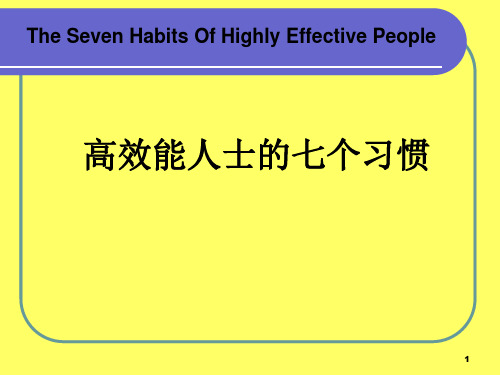
效率是产出和产能的平衡
产出(Production)是指生产出来的结果
产能(Production Capability)是指生产以及进一 步生产的能力和资源
中国成语中的产出和产能
杀鸡取卵 ...?
产出
产能
8
信任乃是情感的帐户
人际关系里信任程度的深刻暗喻!这是说,你与他人的一
切联系都可以被想像为在个人的信任帐户中存款或者取款:
你在关系里投入、建立、修缮并维护,就是存入情感(信任):和
蔼可亲,严守诺言,尊重、忠诚、道歉等等;
反之,你就是提取情感(信任):态度恶劣、破坏期望、八面玲
珑、骄傲、不合作等等。
9
故事I:习惯何其重要!
父子两住山上,每天都要赶牛车下山卖柴。老父较 有经验,坐镇驾车,山路崎岖,弯道特多,儿子眼神较 好,总是在要转弯时提醒道:“爹,转弯啦!”
价值观-我们赋予人、事物、观点或原则的价值或优先级
自我选择的信仰和观点 内部的、主观的,基于我们如何看待世界 受教养、社会和个人反映的影响
我们控制我们的行动,原则控制这些行动的后果
你能选择自己的行为,但你不能选择这些行为的结果 这些结果由自然法则和原则控制
5
习惯的三要素
习惯是知识、技能和意愿的交集
15
故事II: 主动积极——你是你选择
有三个人要被关进监狱三年,监狱长给他们三个一人一个要 求。
美国人爱抽雪茄,要了三箱雪茄。 法国人最浪漫,要一个美丽的女子相伴。 而犹太人说,他要一部与外界沟通的电话。 三年过后,第一个冲出来的是美国人,嘴里鼻孔里塞满了雪 茄,大喊道:“给我火,给我火!”原来他忘了要火了。 接着出来的是法国人。只见他手里抱着一个小孩子,美丽女 子手里牵着一个小孩子,肚子里还怀着第三个。 最后出来的是犹太人,他紧紧握住监狱长的手说:“这三年 来我每天与外界联系,我的生意不但没有停顿,反而增长了200%, 为了表示感谢,我送你一辆劳施莱斯!” 这个故事告诉我们,什么样的选择决定什么样的生活。今天 的生活是由三年前我们的选择决定的,而今天我们的抉择将决定我 们三年后的生活。我们要选择接触最新的信息,了解最新的趋势, 从而更好的创造自己的将来。
高效能人士7个习惯 BEA版 7 Habits of Highly Effective People
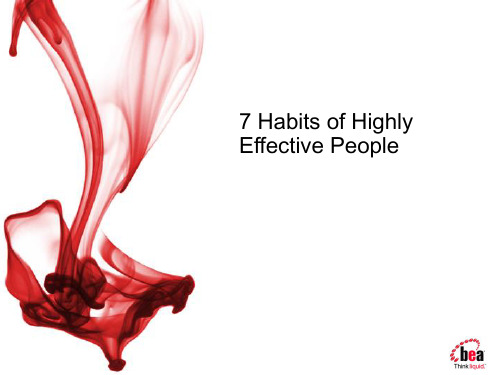
Public Victory
Habit 4: Think Win/Win Habit 5 : Seek First to Understand, Then to Be Understood Habit 6 : Synergize
Renewal
Sharpen the Saw
Habit 1- Be Proactive
Production (P):
The desired results.
Agenda
The Seven Habits – An Overview Private Victory
Habit 1 : Be Proactive Habit 2 : Begin with the End in Mind Habit 3 : Put First Things First
7 Habits of Highly Effective People
Agenda
The Seven Habits – An Overview Private Victory
Habit 1 : Be Proactive Habit 2 : Begin with the End in Mind Habit 3 : Put First Things First
Principles
Self evident Eternal Natural Laws Principles of Effectiveness - Integrity, humility, courage, justice, patience, simplicity, forgiveness, tolerance.. Superb Results : Align our paradigms with principles of effectiveness. When we understand these principles, they empower and enable us. Eg: As a DRE, you exercise courage, patience, integrity in dealing with the customer, then you have control over the case
china daily双语新闻7 habits of highly ineffective people
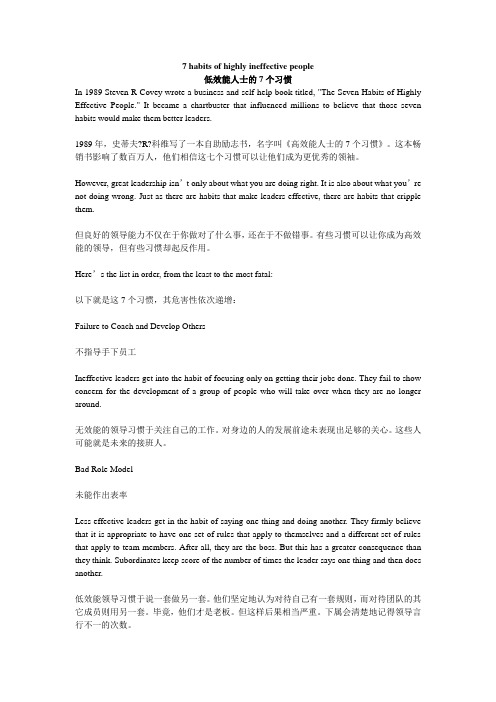
7 habits of highly ineffective people低效能人士的7个习惯In 1989 Steven R Covey wrote a business and self-help book titled, "The Seven Habits of Highly Effective People." It became a chartbuster that influenced millions to believe that those seven habits would make them better leaders.1989年,史蒂夫?R?科维写了一本自助励志书,名字叫《高效能人士的7个习惯》。
这本畅销书影响了数百万人,他们相信这七个习惯可以让他们成为更优秀的领袖。
However, great leadership isn’t only about what you are doing right. It is also about what you’re not doing wrong. Just as there are habits that make leaders effective, there are habits that cripple them.但良好的领导能力不仅在于你做对了什么事,还在于不做错事。
有些习惯可以让你成为高效能的领导,但有些习惯却起反作用。
Here’s the list in order, from the least to the most fatal:以下就是这7个习惯,其危害性依次递增:Failure to Coach and Develop Others不指导手下员工Ineffective leaders get into the habit of focusing only on getting their jobs done. They fail to show concern for the development of a group of people who will take over when they are no longer around.无效能的领导习惯于关注自己的工作。
7_Habits_of_Highly_Effective_People

习惯七:不断更新——自我成长的原则
不断更新就是如何在四个基本生活面向(生理、 社会情感、心智及心灵)中,不断更新自己、 提升自己。这个习惯提升了其它六个习惯的 实施效率。对组织而言,习惯七提供了战略、 流程及运营平台的持续改善,使组织不至呈 现老化及疲态,并迈向新的成长之路。对家 庭而言,习惯七透过固定的个人及家庭活动, 使家庭效能升级,就像建立传统,使家庭日 新月异,即是一例。
优秀是一种习惯。因为思想决定行动,行动决定习 惯,习惯决定品德,品德决定命运。因为你越是主 动积极,就越能以终为始地掌握人生方向,坚持要 事第一地有效管理人生,能够不断砥励自己,不断 更新,与时俱进的人方懂得如何知彼解已,不断地 自我增值,并找寻圆满的双赢思维、统合综效的解 决之道,在自我发展、完善的同时,为亲朋好友、 公司、社会创造价值。
史蒂芬‧柯维(Stephen R. Covey) ‧《时代杂志》评选年度最具影响力人物 ‧“推动美国前进的25 双手”重要领袖之一 ‧《经济学人》杂志推举为最具前瞻的管理思想家 “人类潜能导师”史蒂芬‧柯维(Stephen R. Covey)是国际知 名的领导工作 权威、家庭专家、公司顾问、柯维领导中心创建人,及富兰克 林柯维公司 ()的联合主席。拥有哈佛企管硕士 及杨百翰大学博 士学位的柯维博士,以传授七习惯及领导工作为终生职业,经 年教学组织行为及 商业管理,在领导理论,家庭与人际关系,个人管理等领域久 负盛名。AT&T、 通用电子、福特、全禄、可口可乐等大公司的高级主管都是他 的学生,而来自个 人、家庭、企业、教育界及政府领导者的受教生更高达数百万 人。柯维是一位高 明的企业家,不但在被美国《时代杂志》选为全国25 位最具影 响力的人物之一, 还是克林顿总统倚重的顾问,他是《经济学人》杂志推举为最 具前瞻的管理思想 家,多次透过卫星转播,对全球最先进的国家阐释其精密的组 织观点。 The 7 Habits of Highly Effective People——Stephen R. Covey 编者
高效能人士的七个习惯 -7 Habits of Highly Effective People

Reactive Behavior
Reactive Behavior
Proactive Behavior
Proactive Behavior
Proactive Challenge
Think about tomorrow and anticipate one thing that will push your reactive buttons. Decide what you can do to be proactive in this situation. Do it.
1. Judge
2. Probe
3. Advise
Do’s of Empathic Listening
1. Reflect Feeling
2. Reflect Meaning
3. Use Empathic Listening Starters
Empathic Listening Starters
Habit
5
Seek First to Understand, Then to Be Understood®
HOW DO I LISTEN EFFECTIVELY? • Practice Habit 5: Seek First to Understand, Then to Be Understood • Use Empathic Listening®
The 7 Habits of Highly Effective People
Habit
1 2 3
Be Proactive
®
Take responsibility for your life.
Habit
Begin With the End in Mind
The7HabitsofHighlyEffectivePeople中文版阅读题要

The 7 Habits of Highly Effective People 中文版阅读题要1.第一章: 由内而外地改变自己:a.要改变现状,就要改变自己,要改变自己,先得改变我们看待外界的观点.b.150年前的著作注重的是(Character Ethic)品德;如正直、谦虚、诚信、勤勉、朴实、耐心、勇气、公正等;近代则是强调(Personality Ethic)个人魅力,如个性、社会形象、人际关系技巧、积极进取心态等以及由此衍生出来的行为习惯如“态度决定成败”、“微笑比皱眉更能赢得朋友”等。
但不避讳玩弄手段,伪装自己等。
后者着重的是技巧与捷径。
c.从自身下功夫,不讲究技巧捷径,着重调整内心真正的动机与对孩子的看法。
不设法去改变他,转从客观的角度去了解,找出他独特的个性与特质。
d.唯有基本的品德能够为人际关系技巧赋予生命。
e.Paradigm “思维”,广义是指我们看待外在世界的观点。
我们的所见所闻并非直接来自感官,而是透过主观的了解、感受与诠释。
因此会出现不同的人对同一事物有不同的看法,并且都能成立的情况。
f.顿悟—思维转换Paradigm shift.思维与品德是息息相关的,什么样的人就有什么样的思维。
本性不改,思维也难以转换。
g.战舰和灯塔的对话,说明认清事实在日常生活中,如同置身于浓雾中的船长,同样很重要。
h.原则Principle 不同于价值观Value ,价值观有正误。
价值观是地图,原则才是真正的实际位置,唯有借助正确的原则,才能认清事实的真相。
i.与配偶、子女、朋友或同事相处,最要紧的就是学习倾听,这需要相当成熟的修养。
倾听代表耐心、开放与想要了解对方的诚意,这些都属于成熟的人格。
反之,自说自话、不尊重别人却轻而易举得多。
j.经验告诉我,教导孩子也要因时制宜。
在关系紧张、气氛僵硬的时候,教导会被视为是价值判断与否定。
但私下相处融洽时,循循善诱,效果极佳。
所以真正有益于孩子的教养方式,应该是以充分的耐心,培养他们拥有的感觉,同时以足够的智慧,教导他们“乐善好施”的价值,并且经常以身作则。
- 1、下载文档前请自行甄别文档内容的完整性,平台不提供额外的编辑、内容补充、找答案等附加服务。
- 2、"仅部分预览"的文档,不可在线预览部分如存在完整性等问题,可反馈申请退款(可完整预览的文档不适用该条件!)。
- 3、如文档侵犯您的权益,请联系客服反馈,我们会尽快为您处理(人工客服工作时间:9:00-18:30)。
富道德心(晓得对与错,有正直感).
– Independent will (acting independent of external influence).
独立的意志(不被外来影响所左右).
11
Habit 1 - Be Proactive 积极主动
– Circle of Influence includes those things that an individual can affect directly.
影响范围是指那些我们可以有直接影响的事物.
– Circle of Concern comprises all matters about which an individual cares.
关注范围是指那些我们关注的事务.
– Focus on things that you can influence.
Be Proactive 积极主动
Begin with the End in Mind 以终为始 Put First Things First 要事第一 Think Win/Win 双赢思维 Seek First to Understand, Then to be Understood 知彼解己 Synergize 统合综效
The 7 Habits of Highly Effective People
高效能人士的七个习惯
主讲人:田海昌 Speaker: Tian Haichang 河南 新乡 Xinxiang City, Henan Province
1
The 7 Habits 七大习惯
Habit 1 习惯一
Habit 2 习惯二 Habit 3 习惯三 Habit 4 习惯四 Habit 5 习惯五 Habit 6 习惯六
14
Habit 2 - Begin with the End in Mind以终为始 • For example, if you know what you want to accomplish in a meeting, you can define the purpose of the meeting, enabling the attendees to focus on and meet the intended objectives. 比如:如果要一个会议有建树,你可以 先列出会议议程,好让出席者能集中地 按议程讨论和达到会议目标.
17
Habit 3 - Put First Things First 要事第一
Urgent 紧急
Important
Not Urgent 不紧急 II •防患于未然 •改进产能 •规划,休闲 IV •繁琐的工作 •浪费时间的事 •有趣的活动
重要
I •危机 •急迫的问题 •尤其限于压力的计划 III •不速之客 •某些电话 •受欢迎的活动
把心力投注于自己能有所作为和控制的事情.
12
Circle of Influence (COI) 影响范围
Circle of Concern 关注范围
Circle of
Influence
影响范围
13
Habit 2 - Begin with the End in Mind 以终为始 • Most effective people shape their own future instead of letting other people or circumstances determine their destiny. 高效能人士不等别人或环境决定他们的命运而 是自己去塑造. • They mentally plan and then physically create their own positive results. 他们有心智的策划和实际的创造.
积极主动的人有三种个性:
–Responding according to values. 按价值观做出反应. –Accepting responsibility for their own behaviour.
对自己的行为负责任.
–Focusing on their Circle of Influence.
Desire 欲望
5
Paradigm 范例
• Paradigm is the way an individual perceives, understands and interprets the surrounding world. A mental map.
范例是一个人对周围世界的感知、理解和解释,是精神地
15
Habit 3 - Put t Things First 要事第一
• First things are those things we find most worth doing. They move you in the right direction. 把最值得做的事务放在第一位。他们使你往对的方向 发展.
Independence 独立期
3 要事第一 个人的成功
1 积极主动
7 Habits and the 3 stages of dependence 七个习惯与三个 成长阶段的关系
2以终为始
Dependence 依赖期
8
Habit 1 - Be Proactive 积极主动 • Proactive people have 3 characteristics:
双赢思维是把生活看作是一个合作的舞台,达到利人利己的结果.
• Characteristics of win-win are:
双赢思维的个性:
– Seeks mutual benefit.
争取利人利己(寻求互惠互利).
– Is cooperative, not competitive.
是合作性,非竞争性.
有利改变
Proactive 积极主动
10
Habit 1 - Be Proactive 积极主动
• Proactive people exercise the following:
积极主动的人有以下的作风:
– Self-Awareness (examining thoughts, moods and behaviour).
Habit 7 习惯七
Sharpen the Saw 不断更新
2
Habit 习惯
• Habit is the intersection of knowledge, skill and desire. 习惯是知识,技能和欲望的混合体. • Knowledge is understanding what to do and why to do it. 知识是懂得该做什么和为何要做. • Skill is knowing how to do it. 技能是懂得如何做.
关注自己的影响范围.
9
Stimulus and Response
Stimulus 刺激 Response 回应
Reactive 消极被动
Stimulus 刺激
Freedom to Choose 选择的自由
Self-awareness 自觉 Imagination 想象力 Independent will 独立意志 Conscience 良知
break with tradition, old ways of thinking or
old paradigms.
每一个重大的突破始于,旧思想,旧传统,旧范例或
旧思维的突破.
7
Interdependence 互赖期
5 知彼解己 6 统合综效
7 Sharpen the Saw 不断更新
公众的成功 4 双赢思维
• An activity is important if we find it valuable and it contributes to our mission, values and goals.
一件重要的任务是视为有价值的和对我们的使命,价 值观和目标有贡献的.
16
Habit 3 - Put First Things First 要事第一 • An activity is urgent if we feel it requires immediate attention. 一件紧凑的任务是需要立即地关注. • The best use of our time is to focus on important activities. 最佳利用我们时间的方法是要集中精力于重要 的事务,排除次要事物上的牵绊.
21
Habit 4 - Think Win-Win 双赢思维
高 Lose/Win 损己利人 Courage 勇气 Lose/Lose 两败俱伤 低 Win/Lose 损人利己 高 Win/Win 利人利己
Consideration 体谅
22
Habit 5 - Seek First to Understand, Then to be Understood 知彼解己
3
Habit 习惯
• Desire is motivation or wanting to do it. 欲望是想做(动机)或要做. • To make habits, we need to develop all 3
components.
要养成习惯,我们需要发展这3方面.
4
Habit 习惯
Knowledge 知识 Habit 习惯 Skill 技能
Not Important
不重要
18
Habit 4 - Think Win-Win双赢思维
• Think win-win is a frame of mind and heart that constantly seeks mutual benefit in all human interactions.
